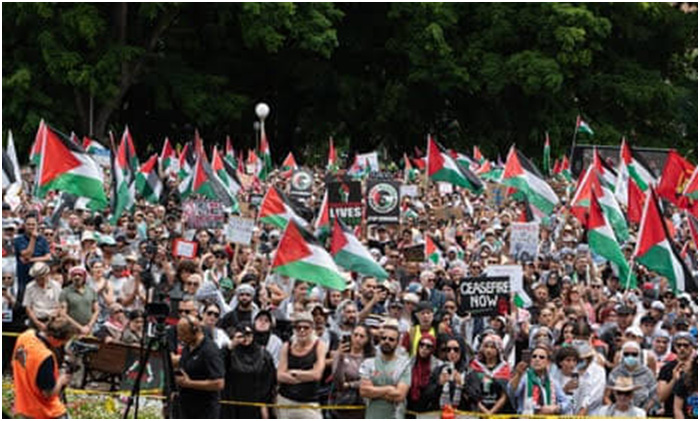Australia Joins Global Allies in Response to Settler Attacks
Foreign Minister Penny Wong has announced that Australia will impose targeted sanctions on several senior Israeli government ministers and individuals associated with violent activity in the occupied West Bank, a move that brings Canberra in line with key allies including Canada, the United Kingdom, New Zealand, and Norway.
The sanctions target figures linked to what Wong described as the “extremist settler project,” which has escalated in recent months amid growing global concern over Israel’s conduct in the occupied territories under the leadership of the Netanyahu government.
“Australia will not stand by as illegal settlements expand and civilians are attacked,” Wong said during Friday’s media briefing. “These actions are inconsistent with international law and our shared human rights values.”

Penny Wong delivers sanctions announcement at Parliament House, Canberra.
Hilary Wardhaugh/AFP via Getty Images
Sanctions Follow Mounting International Pressure
The coordinated sanctions follow weeks of pressure on Western governments to respond to settler-driven violence in the West Bank, which has intensified since early 2024. Attacks against Palestinian civilians and land seizures have been widely condemned, prompting calls for accountability measures targeting senior Israeli officials allegedly supporting or enabling the actions.
Australia’s measures include asset freezes and travel bans on a list of Israeli officials whose names are yet to be formally released but are believed to include figures from far-right factions in the Netanyahu cabinet.
“These individuals are directly linked to acts of aggression and displacement,” Wong said. “They must be held accountable.”
Canberra Breaks Silence After Gaza Aid Blockade Crisis
The sanctions also come amid growing humanitarian outrage over the aid blockade in Gaza, where recent reports from aid agencies have warned of children starving and critical medical shortages. While the current sanctions focus on West Bank incidents, the Foreign Minister acknowledged the broader context of the Israel–Gaza conflict and reaffirmed Australia’s call for unimpeded humanitarian access to the enclave.
“What’s happening in Gaza is a humanitarian catastrophe. Australia will continue to advocate for the protection of civilians and the urgent delivery of aid,” Wong said.
Humanitarian agencies have accused the Israeli government of using aid restrictions as leverage in military operations, a charge Israeli officials strongly deny.
Also Read: Monash IVF Under Fire as CEO Resigns Amid Second Embryo Mix-Up

Palestinian family surveys home destroyed in settler raid near Ramallah.
Source: Reuters
Opposition Calls for Caution, Government Stands Firm
While the move has been applauded by international human rights advocates, some opposition MPs questioned whether unilateral sanctions could strain Australia’s diplomatic relationship with Israel.
Shadow Foreign Minister Michael McCormack warned against “reactive diplomacy,” stating:
“Australia must be cautious not to compromise bilateral ties with one of its democratic allies.”
Wong pushed back, asserting that the sanctions align with Australia’s historical stance on international law, human rights, and the two-state solution.
“This is not about picking sides—it’s about standing for principle and peace,” she said.
Australia Joins Growing Coalition of Western Countries
With this decision, Australia becomes the fifth nation to announce direct sanctions related to West Bank settler violence, joining a coordinated diplomatic effort led by Canada, the UK, New Zealand, and Norway. The United States has stopped short of imposing sanctions but has issued multiple warnings about settler activity and its consequences on regional stability.
The coordinated timing of these announcements is seen as a signal to the Netanyahu government that international tolerance for unchecked settler expansion has run out.
“The world is watching,” said Anna Levy, director of the Australian Centre for Middle East Policy. “And Australia is no longer silent.”
Sydney rally feels big today. Step up from last week. #FreePalestine pic.twitter.com/yTJFEQ5Guo
— David Brophy (@Dave_Brophy) November 12, 2023

Protesters in Melbourne call for stronger action on Gaza and West Bank violence.
Source: The Guardian Australia
What Happens Next?
While the sanctions are limited in scope, diplomatic observers say the implications are far-reaching. The move places additional pressure on Israeli leadership, especially at a time when Prime Minister Netanyahu faces internal dissent and international scrutiny.
Australia’s decision is also likely to reignite domestic debates over foreign policy in the Middle East, particularly among diaspora communities, human rights groups, and conservative think tanks.
The Department of Foreign Affairs and Trade (DFAT) will monitor the situation and provide quarterly updates on the enforcement of sanctions and humanitarian developments in Gaza and the West Bank.
Conclusion: A Defining Moment in Australia’s Foreign Policy
The Penny Wong sanctions Israel announcement marks a significant shift in Australia’s approach to the Israel–Palestine conflict. While Australia has long supported a two-state solution and provided humanitarian aid, this is among the most direct condemnations of Israeli policy from an Australian government in decades.
With international alliances backing the move and public sentiment shifting toward human rights accountability, Penny Wong has positioned Australia as a principled voice in an increasingly volatile conflict—one where silence, for many, is no longer an option.

